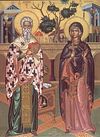

| Previous day | Next day |
| Old Style
October 2
|
Tuesday |
New Style
October 15
|
| 17th Week after Pentecost. Tone 7. | No fast.
|
![]() Hieromartyr Cyprian and Virgin-martyr Justina, of Antioch, and with them Martyr Theoctistus, at Nicomedia (304).
Hieromartyr Cyprian and Virgin-martyr Justina, of Antioch, and with them Martyr Theoctistus, at Nicomedia (304). ![]() Blessed Andrew, fool-for-Christ, of Constantinople (911). St. Theodore Ushakov, admiral of the Russian Navy (1817).
Blessed Andrew, fool-for-Christ, of Constantinople (911). St. Theodore Ushakov, admiral of the Russian Navy (1817).
Martyrs David and Constantine, princes of Argveti, Georgia (740). St. Anna, princess of Kashin (Euphrosyne in monasticism) (1368). St. Cassian the Greek, monk, of Uglich (1504). Blessed Cyprian of Suzdal, fool-for-Christ (1622).
“Hodigitria” (“Directress”) Icon of the Theotokos at Xenophontos (Mt. Athos).
St. Damaris of Athens (1st c.). Hieromartyr Leodegarius (Leger), bishop of Autun (679). Great-martyr Theodore (Gavra) of Atran in Chaldia of Pontus (1180). New Martyr Hadji George of Philadelphia in Asia Minor (1794).
Repose of Hieroschemamonk Theodosius of Karoulia, Mt. Athos (1937), Monk Roman the Soldier, of Valaam (1994), and Schema-archimandrite Alexander (Vasiliev) of the Pskov Caves Monastery (1998).
Thoughts for Each Day of the Year
According to the Daily Church Readings from the Word of God
By St. Theophan the Recluse

Tuesday. [Phil. 2:17-23; Luke 6:37-45]
Judge not, forgive, give… It seems like nothing but expenses, without any profit. But behold what is promised: if you do not condemn, you will not be condemned; if you forgive, you will be forgiven; if you give, you will be given to. Right now the profit is not visible, but it will undoubtedly come for the one who makes these expenditures from the heart—it will come precisely at that time when he needs non-condemnation and forgiveness the most. How he will rejoice when he is suddenly made worthy to receive such good gifts as if for nothing! And on the contrary, how another will sorrow and grieve, because he did not know how to profitably manage his property! He would now forgive everything and give away everything, but it is too late: everything has its time. Not everyone pursues the profit that comes directly into one’s hands, almost right after the expenditure. A Russian proverb says, throw bread and salt behind you, and you will find it in front of you. This kind of action really is like throwing something, but in this case it is not thrown underfoot to be trampled, but into the hands of God. These hands are true, and sure to return what they receive. Just hold to faith and hope.
Monday. [Phil. 2:12-16; Luke 6:24-30]
Woe to those who are rich, who are full, who laugh, and who are praised. But good shall come to those who endure every wrongful accusation, beating, robbery, or compulsory difficulty. This is completely opposite to what people usually think and feel! The thoughts of God are as far from human thoughts as heaven is from the earth. How else could it be? We are in exile; and it is not remarkable for those in exile to be offended and insulted. We are under a penance; the penance consists of deprivations and labours. We are sick; and most useful for the sick are bitter medicines. The Saviour Himself all of His life did not have a place to lay His head, and He finished his life on the cross—why should his followers have a better lot? The Spirit of Christ is the spirit of preparedness to suffer and bear good-naturedly all that is sorrowful. Comfort, arrogance, splendour, and ease are all foreign to its searching and tastes. Its path lies in the fruitless, dreary desert. The model is the forty-year wandering of the Israelites in the desert. Who follows this path? Everyone who sees Canaan beyond the desert, boiling over with milk and honey. During his wandering he too receives manna, however not from the earth, but from heaven; not bodily, but spiritually. All the glory is within.
Articles
 Martyrs David and Constantine, princes of Argveti, GeorgiaThe princes David and Constantine Mkheidze of Argveti were faithful Christians and skilled military leaders. |








